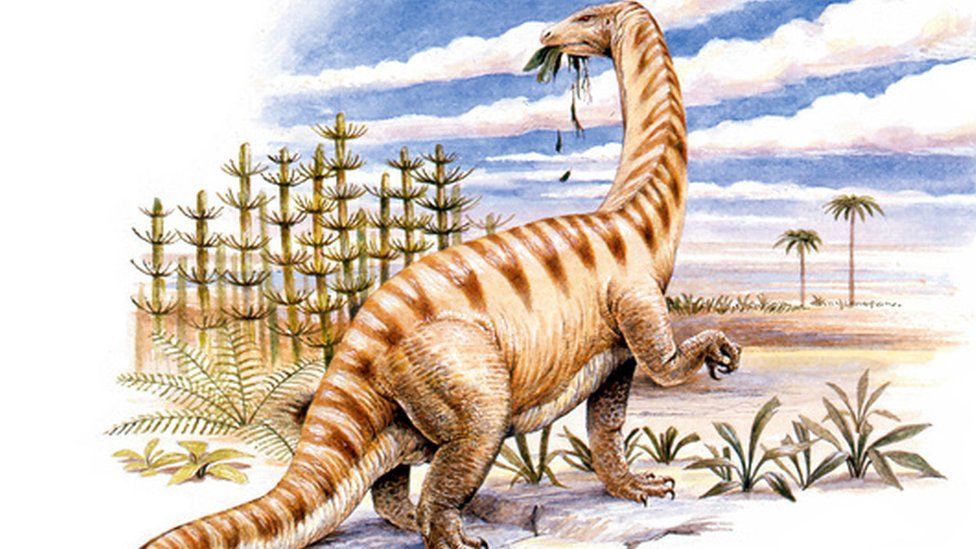'Startling' dinosaur protein discovery
- Published

The dinosaur was a long-necked beast that reached 9m (30ft) in height
Ancient proteins dating back 195 million years have been found inside a dinosaur bone.
The discovery pushes back the oldest evidence for preserved proteins by 100 million years.
Scientists have also found traces of a mineral that probably came from the blood of the early Jurassic dinosaur.
Soft tissues provide new insights into the biology of dinosaurs and how they evolved.
They are rarely preserved during the process of fossilisation, during which bones and teeth are slowly transformed into "rock".
Robert Reisz, a palaeontologist from the University of Toronto Mississauga, in Canada, said: "We hope to be able to learn more about the biology of these animals and the more we know about their soft tissues the more we will know about them overall.
"We are actually looking at the preservation of the original materials that were in the living organism rather than an impression of the soft tissues that were there."
Dinosaur blood
The researchers studied the fossils of a Lufengosaurus dinosaur using infrared spectroscopy with a synchrotron in Taiwan.
Preserved fragments of collagen and iron-rich proteins were found within the walls of blood vessels running through rib bones.
They think the remains of dinosaur blood may have preserved the collagen for almost 200 million years.
A section of rib showing a vascular canal with dark haematite particles that probably came from dinosaur blood
Scientists were able to examine the chemical contents of the rib bone of a Lufengosaurus dinosaur without extracting the contents and risking contamination
Stephen Brusatte of the University of Edinburgh, who is not connected with the research, said the discovery was "a jaw-dropper".
"To find proteins in a 195-million-year-old dinosaur fossil is a startling discovery," he told BBC News.
"It almost sounds too good to be true, but this team has used every method at their disposal to verify their discovery, and it seems to hold up."
He said the fact that proteins can survive for so long has two big implications.
The preservation of microscopic proteins for nearly 200 million years tells us that there is still much to learn about how fossils form.
And the findings appear to corroborate previous reports of similar proteins in other dinosaurs, that are about 70 million years old.
"This discovery tells us that yes, you really can probably preserve soft, microscopic proteins inside dinosaur bones for tens or hundreds of millions of years," Dr Brusatte added.
"And that opens up entirely new avenues for studying dinosaurs."
Giant plant-eater
Lufengosaurus belongs to a group of dinosaurs which lived during the Early Jurassic Period in what is now south-western China.
A site in south west China has produced dozens of skeletons of the plant-eating dinosaur.
The discovery follows research by the same team on the oldest dinosaur embryos ever found.
Insight into life in a dinosaur egg
The research is published in the journal, Nature Communications, external.
Follow Helen on Twitter., external
- Published10 April 2013